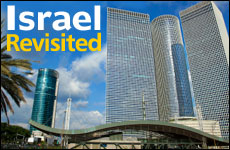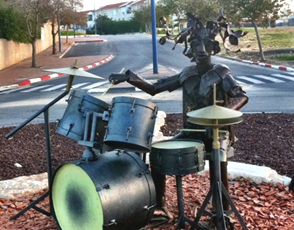 Vampire Weekend's Surprising Jewish Stories
Vampire Weekend's Surprising Jewish Stories


4 min read
3 min read
4 min read
6 min read
Is Israel as terrible as the media makes it seem? I moved to Tel Aviv for two months to find out.
I spent a year studying at Hebrew University of Jerusalem in 1964. Nearly 50 years later, the country has gone through many changes and as a Canadian I have watched from afar with interest. One of the changes I observed is that Israel has been the subject of an aggressive international deligitimization campaign claiming that Israel is somehow an illegitimate entity.
It’s hard to read between the lines of the media commentary and get to the truth, so I decided to put my business in Vancouver on hold, rent an apartment in Israel for two months, and answer the question for myself: What is the real Israel? Here are my conclusions.
Nowhere else in the world does a country contain so much diversity in so small a space. Nowhere else in the world has a country successfully dared to accomplish so much with so little.
There is no overriding sense of panic or danger.
During the two months of my stay, it was hard for me to believe that every day Israel is a place seriously in danger of extinction by determined enemies. People seem to go about their lives very normally. There is no overriding sense of panic or danger. No curtailing of activities. If anything, there is widespread evidence of people enjoying life. For example, one day I was hiking with a friend who suggested that we search for spring wildflowers, poppies and irises. We were not alone. The hills were dotted with almost as many people as there were flowers, excitedly pointing out where the largest clusters could be found. The wind carried the sounds of “oohs“ and “ahs” up and down the hills.
While the military and security are an important part of life in Israel, I never perceived it as an intimidating or threatening presence. For one thing, the soldiers are so young. Except for their uniforms and rifles (which they carry at all times), they don’t stand out. They behave like young people everywhere, walking about with earbuds implanted, or just hanging out with each other in groups, lying on their duffle bags while waiting for buses. They are shown a great deal of deference by the general population, who treat them as everyone’s children, which of course, they are.
It’s a wonderful paradox of Israeli life that a country in danger of annihilation, with a large military presence, not only feels safe, but normal.
I was getting my hair cut on a cold, rainy day in Tel Aviv when the postman arrived at the salon to deliver the mail. “You must be soaked and freezing,” said Liz, the shop owner. “Here. Sit for a moment and let me make you a cup of tea.” Grateful for the gesture, the postman did not have to be asked twice. “I’ve had a lot of tea today,” he said with a broad smile, implying that this was not the first time this kindness had been extended to him.
Living with Purpose
No, I did not get the impression that life in Israel is ideal. Far from it. There is a very large gap between the haves and the have nots. Daily economic life is a struggle for many people. Over and over, ordinary middle-class people told me that they work very hard just to make ends meet. “Why do you stay?”, I would ask. Zehavit gave me a characteristic answer:
Thirty-two years old and engaged to be married, she owns a nail boutique in downtown Jerusalem, works 60 hours a week and lives frugally, and complains that she and her fiancé have no money to put aside at the end of the month. She previously lived in the U.S. for three years, but came back to Israel. “In the U.S. life is so much easier,” she said. “But people care about each other in Israel.”
Most people who live in Israel do so because this is where they want to be. They could live elsewhere, and often have. But they choose Israel. They want to build a country, to make a difference, to belong, to be part of history, Jewish destiny, or perhaps to embrace the Chinese curse of living in interesting times. There’s a very compelling sense of purpose in this country. It’s more than just patriotism. And it’s not just about surviving. It’s about living with purpose. It’s about a reverence for life. Trying to put it into words makes it sound almost maudlin and trivial.
 There’s a sculpture in Sderot which to me exemplifies what words cannot convey. For many years, Sderot has been Israel’s most vulnerable city. After Israel pulled out of Gaza, the locals began launching Qassam rockets at Sderot – over 6,000 of them – which did a lot of damage, both property and psychic. Eventually Israel’s incursion into Gaza and the use of sophisticated equipment that intercepts rockets has diminished the terror.
There’s a sculpture in Sderot which to me exemplifies what words cannot convey. For many years, Sderot has been Israel’s most vulnerable city. After Israel pulled out of Gaza, the locals began launching Qassam rockets at Sderot – over 6,000 of them – which did a lot of damage, both property and psychic. Eventually Israel’s incursion into Gaza and the use of sophisticated equipment that intercepts rockets has diminished the terror.
At an intersection in Sderot, there’s a sculpture of a man playing a drum kit. What’s unusual about it is that it was made from the metal of Qassam rockets. To me the sculpture, and the spirit behind its creation, speak about survival with grace, about taking something that has lethal intentions and almost perversely, turning it into a thing of beauty. It’s a powerful Israel way of saying, “You will not defeat us. “
On my last night in Israel, my friend and I went to a fish restaurant in the neighbourhood. We were seated near the kitchen, and I noticed that the two chefs were Asian, but I couldn't identify their ethnic origin. I asked our young waitress, a student at Tel Aviv University. “They're Burmese," she replied. "They came here as political refugees."
"How many Burmese are in Israel and how did they get here?" I asked. She went into the kitchen and came back a moment later with the answer. "There are about 200 in Israel and they came here through Thailand. They heard that Israel was a good place for refugees."
My two months in Israel was eye-opening. Israel was not the country that I remembered nearly 50 ago when I studied there as a college student. Now, it is so much better.
